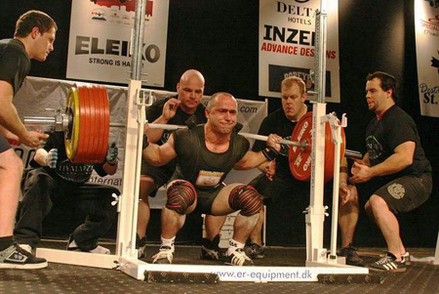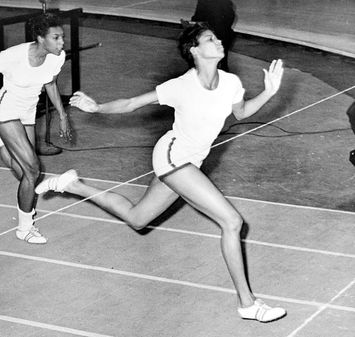 Yep, that's an intense lift. This follows on from my post about Relaxation And Intensity. We go to the gym in order to experience failure. I don’t say that to appear hard-assed, because when you embrace this concept rather than let it get you down, it makes your experience of the gym so much more satisfying. More than success, it’s failure that makes us strong on both a physiological and psychological level. We learn much more about ourselves from failing than we do from succeeding, and when you fail in a safe environment, the first thing you learn is that failure isn’t a bad thing. The gym gives you a physical experience of striving in the face of failure and a physical experience of standing up for yourself against insurmountable odds (because let’s face it – the weights will always win, they’re not getting any lighter). In my own experience (yours might well differ) it’s failure that actually builds my confidence; failure in the right context, and my subsequent recovery from it – whereas success teaches me only that I was right all along... Which is certainly nice, but not necessarily useful, because I don't need my training to validate me. I want it to count towards my growth and development. It's actually optimism that inspires me to seek out failure. It’s how I know I’m testing or pushing my limits. This is where training intensity comes in. Lifting heavy things, sprinting, and other methods of training intensely teach you the skill of standing up for yourself, and so you develop confidence. It does this because the body and mind are actually the same thing – we are one being, not two disparate elements that have nothing to do with each other. But it only really only works if you train with awareness, safety and you don’t bite off more than you can chew. You should be training in a way that is both challenging and achievable. People like to use various tools to measure intensity, few of which I find practical, because I think you know when you’re training hard and more importantly – your strength and ability to train intensely develop hand-in-hand and neither one can really be rushed. When I was weak, it didn’t really matter what anyone said or how hard my trainer was pushing me – I was physically incapable of reaching the point of intensity which I am now capable of reaching, now that I'm stronger. Whether that incapability was in my muscles, or my brain, or somewhere in between is actually irrelevant. The more you push yourself, the more you develop the ability to push yourself. Here’s where training styles come in. I don’t think it’s my job to push my clients to the point of failure, unless that’s specifically what they want from their training. It’s my job to provide the opportunity for my clients to learn about themselves, develop their own awareness, and build the skills of being resourceful and looking inside themselves for their own strength. So I will often choose an appropriate exercise and a weight for my client, and then let them work as hard as they like, because autonomy is – I think – one of the most important things in training and life. I’m not training children, I’m not training athletes, I’m training adults who want to improve their fitness, and it’s important to me that they know they’re ultimately the ones in charge. This ensures that they feel safe and free to push as hard as they want. It doesn’t matter if we never talk about it, because when you train you’re experiencing your own autonomy, commitment and development, rather than intellectualising it all. But you do have to be training with awareness for this to work. You need to know that with intensity comes growth, and through failure we learn the truth. My view on this issue may be a bit narrow and it’s certainly not how everyone likes to train, but it would be rather arrogant to think I can teach people about themselves simply by barking orders; it would be arrogant to think I can teach people about themselves to begin with. People teach themselves about themselves. If I wanted to create an army of boot-camp obsessed trainees, barking mindless orders is the way to go, but it’s not me. I actually want to promote autonomy rather than dependence; to encourage self-knowledge rather pander to the societal expectations of fitness training. There were a couple of people in the gym the other night who complained that their session didn’t have enough variety – it wasn’t interesting enough. As much as I believe training should be varied, fun and rewarding, your training doesn’t need to be entertaining, it only needs to be training. We have to make the effort to bring ourselves to the work at hand, otherwise we’re just stuck in games of self-deception and chasing the vague hope that maybe one day we’ll be successful and fit. The style of most trainers is to go for variety, to constantly entertain their clients so they don’t ever actually have to use their heads, they don’t have to worry about developing skills and actually getting good at something; it seems we want to get fit and thin and muscled without having to think about it, without having to work at it, without having to develop the brain-body connection at all. And whatever you’re working towards, training mindlessly isn’t a recipe for success. So what ‘should’ we be working at? What should we be paying attention to?  I don't think there's one particular style or technique that's best; I like to think in terms of body-awareness and concentration, because it suits me. And I push myself to train intensely because that’s what I find rewarding at this point in time. Bascially, there’s intensity, duration and frequency. Those are your training variables. If the intensity is high, the duration will probably be low. If the frequency of your training is low (let’s say once a week), in order to progress you’re going to need a good amount of intensity or duration. You can try to nail all three at once, but in the long term that only leads to burn-out, and that’s no fun at all. We’re told these days that high-intensity interval-style cardio is the best training method for fat-loss. If that’s true, if any ‘best method for fat-loss’ is true, why aren’t they working? Anyway, I think there’s a limit to how much intense training you can do in your week. Many bodybuilders favour low-intensity cardio methods such as walking, and I imagine it’s because they train with such high intensity in the weights room day-in, day-out. I love walking, for me it’s an intuitive choice, and although I’m no bodybuilder, I think if I was doing intense-cardio-intervals on top of my weights training, it’d just be too much for my central nervous system and I’d fry it in the frying-pan of obsessive excessiveness. But this probably isn’t going to be an issue for you if you’ve been training intensely for less than two or three years. At any rate, if you’re aware of how hard you’re working, and for how long, you can train in the way you think is best, and you work that out the same way anyone else does: through your own personal experience. Having said all that, I don’t think you should train to absolute failure very frequently, but I do think it’s good to train with intensity fairly often, and the only way I know of to work out what’s what is to push yourself as far as you can possibly go, but only every now and then. And see what it’s like on the other side. The population is mostly arrogant and elitist, but also satisfied with their training... But really I’m just trying to come up with arguments as to why you should train intensely because it’s what I like to do, whereas what you should actually be doing is whatever you personally find rewarding. And that certainly won’t be training intensely all the time, but it might mean training intensely some of the time. Hopefully what I've written will encourage you to train intensely, because there's really nothing to be anxious about. It can be a thoroughly satisfying experience, as long as you keep in mind that you're the one in charge, and you don't ever have to attempt a lift that you aren't 100% confident you can complete. It might be really hard, but that's okay, because it's supposed to be really hard if you're trying to develop your athleticism.
5 Comments
Jackson
6/19/2011 02:47:16 pm
Hi Chris
Reply
Chris Serong
6/19/2011 04:41:54 pm
Hey Jackson!
Reply
Chris Serong
6/19/2011 04:49:07 pm
...Not to mention, when you train so hard that you feel destroyed afterwards, that sort of training only really stimulates progression in advanced trainees, and even they shouldn't train that way all the time. If you're not already fit, that level of fatigue will only interfere with your ability to recover properly, it won't actually help you to progress.
Reply
Jackson
6/20/2011 05:08:09 pm
Ah, your words are like a balm to my flab-encrusted soul. Thank you for your voice of reason!
Reply
Chris Serong
6/20/2011 05:24:17 pm
Not the first time I've been accused of being balmy.....!
Reply
Leave a Reply. |
